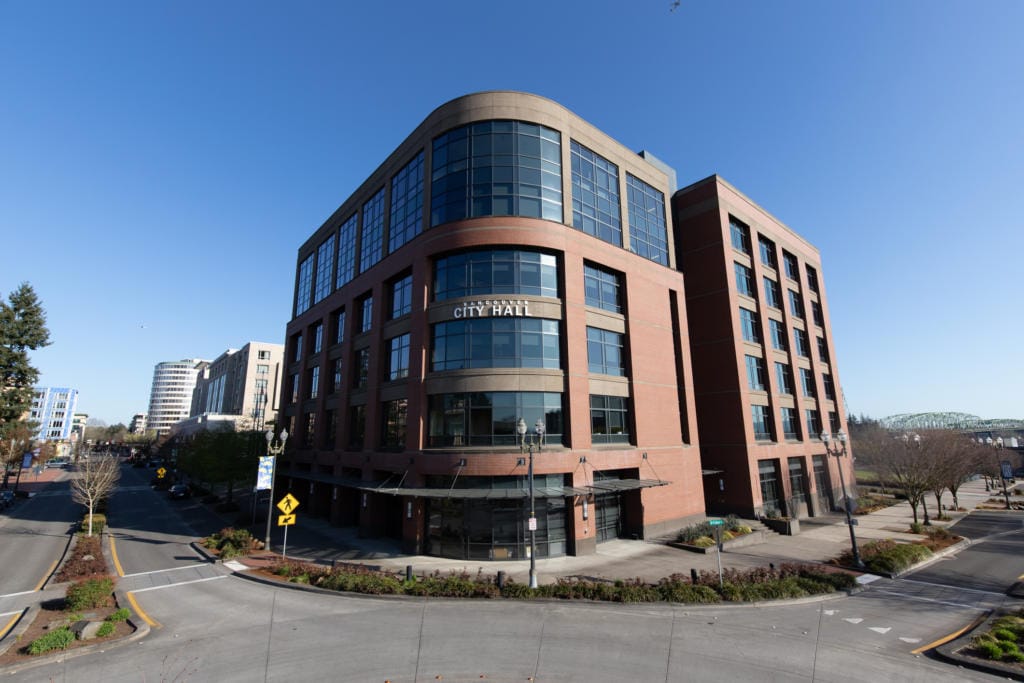The Vancouver City Council passed the 2021-22 biennial budget Monday evening amid continued debate over how the city ought to spend its dollars on law enforcement.
The $1.3 billion budget passed with the support of five councilors and the mayor. The sole dissenting councilor, Ty Stober, said he wants to have a thorough conversation about refocusing police resources, especially when law officers are called on to deal with substance abuse and mental health cases.
“The status quo creates trauma in our community, and the permanent mark an arrest for low-level drug offenses has on an individual can exclude them from productive society for the rest of their life,” Stober said, adding that the trauma disproportionately impacts people of color and low-income residents.
“The vast majority of the budget before us tonight represents my personal values and vision for the city, but in the area of asking our public safety officers to be social workers and drug counselors, it does not.”
A few city residents called into the remote meeting to ask for a reduction in police spending, carrying forward a conversation that started last week when councilors publicly considered the draft budget document.
One, Mike Jokela, urged the council to examine “the underlying causes of why crimes may occur, rather than spending more money on policing.” He cited a 2018 report from the Brennan Justice Center indicating that nonprofit organizations that help reduce poverty also play an important role in reducing crime.
Across the nation, cities are responding to protests against police brutality and discrimination by partially reallocating law enforcement budgets and funneling them into other social services. The Seattle City Council is currently weighing a 17 percent cut to the city’s police funds; a faction of the Portland city council pushed to slash the police department’s $230 million budget by $18 million, though that effort failed in a 3-2 vote earlier this month.
“I am not calling for a reduction in police department funding,” Stober said. “As we enter the new year, I’m asking to support that we have a conversation about where we want our limited police forces focused and how we can change our tactics on substance abuse and mental health.”
Other councilors expressed support for a longer discussion about policing strategy. However, a few also said that the Vancouver Police Department’s budget should actually be higher. The document passed Monday allocates $58.5 million for operation and administration of the department in 2021-22, an increase of about $3 million over the previous biennium.
Councilor Erik Paulsen said that Vancouver’s police department has a smaller budget than other municipalities with similar populations.
“We are inadequately funded for a city of our size. While I am not opposed to spending more money to make our community safer, I don’t believe the answer is (reducing) the funding that we currently provide to law enforcement,” Paulsen said.
The bulk of social services are handled by Clark County, not the city, Councilor Laurie Lebowsky added. Vancouver recently joined a collaborative joint executive group with the county to help tackle homelessness.
“Mental health services, community services — those are the types of things that they do,” Lebowsky said. “That doesn’t mean that the city’s completely not involved, we do play a role in those services.”
Mayor Anne McEnerny-Ogle said she and the rest of the city council will need to “do some homework as to all of the different pieces that the Vancouver Police Department is responsible for, and the different relationships we have with our neighboring municipalities and the county” before continuing the discussion on police funding.
Other elements of the budget
As reported last week by The Columbian, the $1.3 billion budget will be funded in part by increases to the city’s property tax levy, a new affordable housing sales tax, modest upticks in utility rate fees and a larger hike to park impact fees.
The city’s property tax levy will increase by 0.6 percent in the next two years. Water and surface water utility rates will go up by 5 percent, sewer utility rates will go up by 3 percent and garbage and recycling rates will go up by between 1 percent and 3.3 percent.
A new 0.01 percent citywide sales tax is also expected to raise between $4.2 million and $4.5 million for affordable housing projects, “depending on how the economy is doing in that particular year,” said Natasha Ramras, Vancouver’s chief financial officer.
The affordable housing built by those funds will be aimed at families making less than 60 percent of the area’s median income. In addition to being low-income, tenants will also need to belong to another vulnerable group — those with physical or behavioral health disabilities, those who are homeless or at risk of homelessness, veterans, senior citizens, unaccompanied youth or domestic violence survivors will be eligible.
Park impact fees will see a sharper increase. The budget passed Monday includes a 25 percent hike in both 2021 and 2022. It’s overdue, Ramras said.
“This revenue has not been increased since 1994. It’s a very atypical situation for the city,” she told the council. The hike is expected to raise an additional $1.6 million for parks by the end of the biennium.
Of the total $1.3 billion budget, approximately $1 billion is allocated toward operating expenditures and the remaining $300 million toward capital projects.
Around half of the capital project budget is focused on utilities, including $20 million to update Water Station 5. Another $37.5 million will be spent on transportation-focused projects, and $8.4 million on parks. An additional $32.3 million is classified as the “general” portion of capital funds, and will include the development of the new Fire Station 11 in Orchards.




